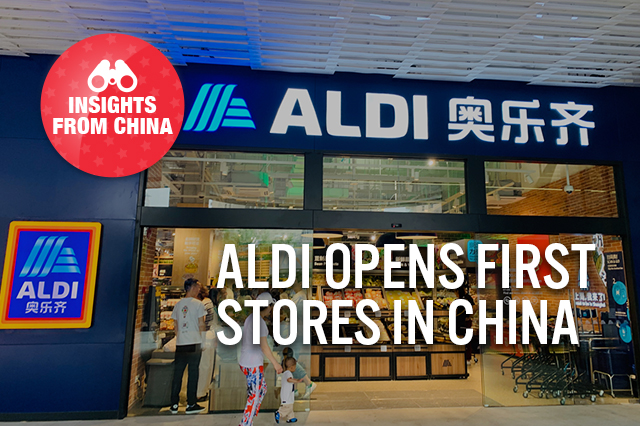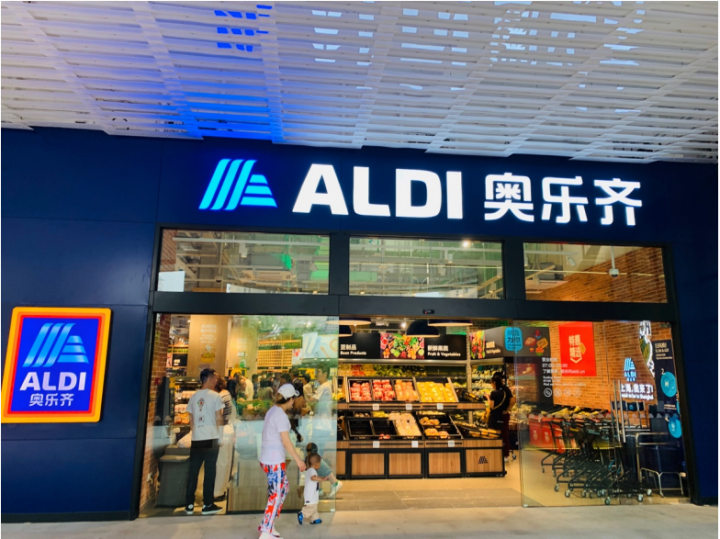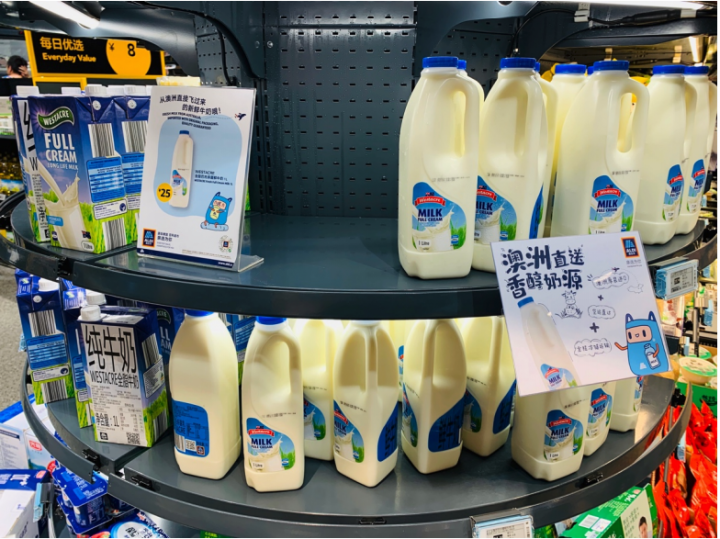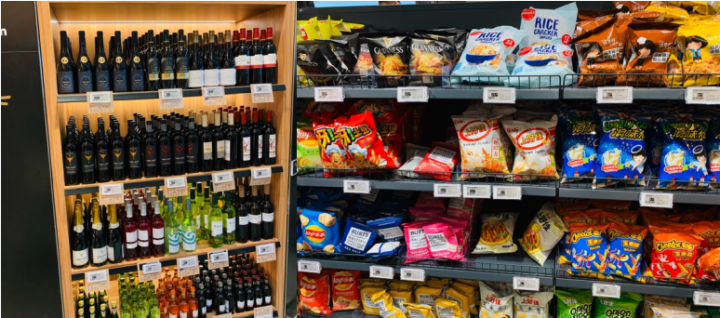
Nitheesh NH
On June 7, Aldi opened its first stores in China with two locations in Shanghai, one in the Jing’an district and the other in the Minhang district. Aldi consists of two companies: Aldi Süd and Aldi Nord, and they divide international markets between them. Only Aldi Süd has expanded beyond Europe, to the US, Australia and, now, China – the 11th market in which Aldi Süd has a physical presence.
Why Did Aldi Open Physical Stores in China Now?
Large international supermarket chains such as Carrefour and Walmart have long been represented in China. Walmart entered China in 1996 and now has more than 400 supermarkets in the country. Carrefour has more than 230.
China’s grocery market is expanding: Food and grocery research and training organization IGD estimates China will overtake the US to become the world’s largest grocery market by 2023, growing 30% between 2018 and 2023 to reach $1.8 trillion.
China is the next logical step for Aldi following recent international expansion. In 2018, Aldi opened its first shop in Italy, the retailer plans to add 20-30 stores a year in Australia in the next three years and is making efforts to become the third-largest grocery chain by number of stores in the US.
[caption id="attachment_90143" align="aligncenter" width="720"] Aldi store in the Jing’an district, Shanghai
Aldi store in the Jing’an district, Shanghai
Source: Coresight Research[/caption] Aldi’s China Entry Strategy: Go Online First, Then Offline Aldi made a soft entry into China in 2017 by selling products on Alibaba’s cross-border e-commerce platform Tmall Global. In 2018, Aldi launched an online flagship store on the domestic Tmall site. Business publication Manager Magazin reported Aldi plans to open 50-100 stores in the medium term. Aldi’s China strategy — going online then offline — let the company test the waters in China before jumping in and build brand awareness with less upfront investment and lower risk. Costco entered the same way: launching a flagship store on Tmall in 2017, with plans to open a physical store in Shanghai in August 2019, according to Chinese media Jiemian. Despite its growing physical presence, online abilities remain important for Aldi: The online platform serves as a way to understand consumer preferences based on Tmall’s big data analysis and to test new products before launching offline. Moreover, online grocery shopping is gaining momentum in China, with the total online grocery market projected to grow 286% by 2023 to account for 11.2% of the total Chinese grocery market, according to IDG. An online store also serves as a platform to connect with consumers who live in tier-3 and tier-4 cities, which are expected to account for around two-thirds of China’s annual consumer spending, which is expected to reach $9.7 trillion by 2030, according to Morgan Stanley. Aldi Sells Imported Goods in Shanghai Stores, Targeting Affluent Customers Though Aldi operates as a discount retailer in Germany and other markets, the retailer is reportedly planning to target a more affluent customer base in China by providing sought-after imported products, according to German trade publication Lebensmittel Zeitung. Lebensmittel Zeitung also reported the store will stock mainly imported goods from Europe and Australia, such as pork knuckle from Germany. [caption id="attachment_90144" align="aligncenter" width="720"] Fresh whole milk from Australia on sale at Aldi’s Shanghai store
Fresh whole milk from Australia on sale at Aldi’s Shanghai store
Source: Coresight Research[/caption] Aldi’s first Shanghai stores will stock more than 1,300 products in 15 categories including fresh produce, snacks, drinks, alcohol, personal care products, ready-to-eat and ready-to-cook meals. [caption id="attachment_90145" align="aligncenter" width="720"] Alcohol and snacks on sale at Aldi’s Shanghai store
Alcohol and snacks on sale at Aldi’s Shanghai store
Source: Coresight Research[/caption] [caption id="attachment_90146" align="aligncenter" width="720"] Fresh-food counter and ready-to-eat meals at Aldi’s Shanghai store
Fresh-food counter and ready-to-eat meals at Aldi’s Shanghai store
Source: Coresight Research[/caption] What are the Risks? Many foreign retailers have entered the China market over the past 20 years and not succeeded. Spanish discount retailer Distribuidora Internacional de Alimentacion SA (DIA) entered the China market in 2003 and opened about 200 convenience stores, but sold its business in 2018. British supermarket chain Tesco, in 2015, offloaded its Chinese business into a state-run company as a minority partner after it ventured in the Chinese market in 2004.Walmart closed a number of Chinese stores in 2013 and 2014. In general, retailers that have imported big-box grocery formats with fewer adaptations to local tastes appear to have struggled the most in China. Those that cater more to “little-and-often” shopping and demand for wet-market-style fresh-food offerings, such as Auchan’s Sun Art joint venture appear to have enjoyed greater success in the market. One risk for Aldi is that its small stores may not allow the large fresh-food ranges that many Chinese consumers demand. However, Aldi has shown it can tailor its offering to local tastes in other parts of the world, and we expect it to do so in China. Key Insights Having both online and offline channels will help Aldi release products that are more relevant to consumers’ needs, and reach a wider group of customers, including those from lower-tier cities. China’s grocery market is growing, though global grocery retailers who have tried to tap this market have met with mixed success. We think Aldi must show willingness to adapt its offering and store formats to local tastes to establish a foothold in China.
 Aldi store in the Jing’an district, Shanghai
Aldi store in the Jing’an district, ShanghaiSource: Coresight Research[/caption] Aldi’s China Entry Strategy: Go Online First, Then Offline Aldi made a soft entry into China in 2017 by selling products on Alibaba’s cross-border e-commerce platform Tmall Global. In 2018, Aldi launched an online flagship store on the domestic Tmall site. Business publication Manager Magazin reported Aldi plans to open 50-100 stores in the medium term. Aldi’s China strategy — going online then offline — let the company test the waters in China before jumping in and build brand awareness with less upfront investment and lower risk. Costco entered the same way: launching a flagship store on Tmall in 2017, with plans to open a physical store in Shanghai in August 2019, according to Chinese media Jiemian. Despite its growing physical presence, online abilities remain important for Aldi: The online platform serves as a way to understand consumer preferences based on Tmall’s big data analysis and to test new products before launching offline. Moreover, online grocery shopping is gaining momentum in China, with the total online grocery market projected to grow 286% by 2023 to account for 11.2% of the total Chinese grocery market, according to IDG. An online store also serves as a platform to connect with consumers who live in tier-3 and tier-4 cities, which are expected to account for around two-thirds of China’s annual consumer spending, which is expected to reach $9.7 trillion by 2030, according to Morgan Stanley. Aldi Sells Imported Goods in Shanghai Stores, Targeting Affluent Customers Though Aldi operates as a discount retailer in Germany and other markets, the retailer is reportedly planning to target a more affluent customer base in China by providing sought-after imported products, according to German trade publication Lebensmittel Zeitung. Lebensmittel Zeitung also reported the store will stock mainly imported goods from Europe and Australia, such as pork knuckle from Germany. [caption id="attachment_90144" align="aligncenter" width="720"]
 Fresh whole milk from Australia on sale at Aldi’s Shanghai store
Fresh whole milk from Australia on sale at Aldi’s Shanghai storeSource: Coresight Research[/caption] Aldi’s first Shanghai stores will stock more than 1,300 products in 15 categories including fresh produce, snacks, drinks, alcohol, personal care products, ready-to-eat and ready-to-cook meals. [caption id="attachment_90145" align="aligncenter" width="720"]
 Alcohol and snacks on sale at Aldi’s Shanghai store
Alcohol and snacks on sale at Aldi’s Shanghai storeSource: Coresight Research[/caption] [caption id="attachment_90146" align="aligncenter" width="720"]
 Fresh-food counter and ready-to-eat meals at Aldi’s Shanghai store
Fresh-food counter and ready-to-eat meals at Aldi’s Shanghai storeSource: Coresight Research[/caption] What are the Risks? Many foreign retailers have entered the China market over the past 20 years and not succeeded. Spanish discount retailer Distribuidora Internacional de Alimentacion SA (DIA) entered the China market in 2003 and opened about 200 convenience stores, but sold its business in 2018. British supermarket chain Tesco, in 2015, offloaded its Chinese business into a state-run company as a minority partner after it ventured in the Chinese market in 2004.Walmart closed a number of Chinese stores in 2013 and 2014. In general, retailers that have imported big-box grocery formats with fewer adaptations to local tastes appear to have struggled the most in China. Those that cater more to “little-and-often” shopping and demand for wet-market-style fresh-food offerings, such as Auchan’s Sun Art joint venture appear to have enjoyed greater success in the market. One risk for Aldi is that its small stores may not allow the large fresh-food ranges that many Chinese consumers demand. However, Aldi has shown it can tailor its offering to local tastes in other parts of the world, and we expect it to do so in China. Key Insights Having both online and offline channels will help Aldi release products that are more relevant to consumers’ needs, and reach a wider group of customers, including those from lower-tier cities. China’s grocery market is growing, though global grocery retailers who have tried to tap this market have met with mixed success. We think Aldi must show willingness to adapt its offering and store formats to local tastes to establish a foothold in China.